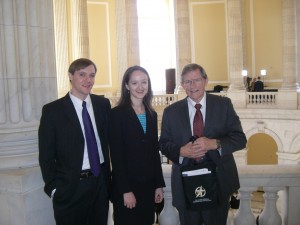The Best Scientists Are Also Citizens of Science

Ph.D. candidate Sarah Margaret Diupek and M.D./Ph.D. candidate Philip M. Boone with Dr. William R. Brinkley on Capitol Hill.
Our state and nation invests a considerable amount of time and money in the preparation and training of our graduate students and postdoctoral fellows in the sciences. We know that the future of our leadership in medicine, science, and engineering depends on recruiting the world’s most talented students and providing them state-of-the-art education and training at the very cutting edge of our respective disciplines. Ideally, the best, brightest, and most talented candidates are expected to achieve success and become the next generation of leaders. Unfortunately, the curriculum for predoctoral and postdoctoral training often excludes a critical component—guidance on how to be an effective “citizen of science.” As a biomedical researcher, my career depends on a steady source of federal funding from various agencies such as the National Institutes of Health (NIH), the National Science Foundation (NSF), and others.
Throughout my career, I have been stressed by the uncertainty of available grant dollars during the up and down years and the “rags to riches” mentality of the federal budgeting process. Clearly, even in the best of times, not all deserving research gets funded and some years are much worse than others. It was not until later in my career, when I became active in my professional organizations, that I came to realize that scientists need to become more directly engaged with the public and with policymakers in government. In the beginning, I was not a very effective spokesperson when given the opportunity to testify at public gatherings or at congressional hearings. Moreover, many of my colleagues were either reluctant to speak or were also ineffective spokespersons. After all, our training and background in scientific research did not include guidance on becoming effective spokespeople and advocates for science in the public arena.

Dr. William R. Brinkley with Philip M. Boone, Congresswoman S. Jackson Lee, and Sarah Margaret Diupek in Washington D.C.
As I became more formally involved with graduate and postdoctoral education as chair of a department, and later as dean of a graduate school of biomedical sciences, I began to think more about the importance of encouraging graduate students and faculty to become effective “citizens of science.” One approach was to form a partnership with Research!America, the nation’s largest not-for-profit public education and advocacy alliance committed to making research to improve health a higher national priority. My dream was to prepare graduate students to become more effective advocates and to take more trainees on trips to Washington to visit “The Hill,” walk the halls of Congress, and learn how to sit down with powerful legislators and become effective speakers and advocators.
A remarkable group of Houston citizens known as Baylor Research Advocates for Biomedical Science (BRASS) elected to support my plan and to fund an annual trip to Washington D.C. accompanied by several of our student “BRASS Scholars.” Typically, we spend two or three days on Capitol Hill visiting our local representatives and various key committee members in the House and Senate. Prior to the trip, I also give a public policy lecture to graduate students and postdoctoral fellows and show a Federation of American Societies for Experimental Biology (FASEB) video on how to meet with your congressman. It is only a small beginning, but I am very encouraged that students understand the need to articulate the value of science to our governmental leaders and share my belief that it should be part of every training curriculum for scientific researchers.
William (Bill) R. Brinkley, Ph.D.
2012 TAMEST President

